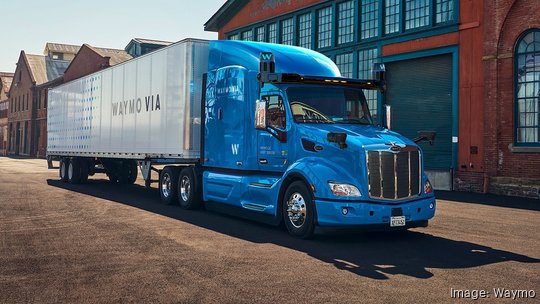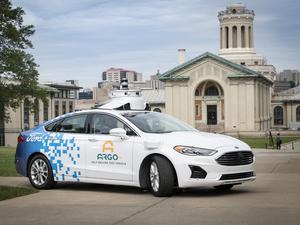
California doesn't yet allow self-driving trucks. Under a new law speeding through the state legislature — and already drawing fire from the industry — such vehicles would have to have human operators inside them once they're allowed on California roads.
The bipartisan legislation — Assembly Bill 316 — would mandate that any self-driving vehicle that weighs 10,001 pounds or more and is either being tested or is transporting people or cargo have a human safety operator on hand. Introduced in January by a pair of Democratic members, it's co-sponsored and co-authored by Tom Lackey, a Republican from Palmdale.
Lackey's support for the bill stems from his decades-long career as a California Highway Patrol officer, where he had to deal with dozens of road-related deaths, he told the Business Journal. The dangers of driving, the range of unexpected conditions people encounter and the fact that people have already been killed in autonomous car-related collisions convinced him of the need for human safety operators, he said.
"I just believe it's very important that we act in the interest of safety over the interest of profits, because I don't think you can place a price tag on human life," Lackey said.
Thus far, his colleagues in the Assembly seem to largely agree. Two of the body's committees — Transportation, and Communications and Conveyance — have already passed the bill; it's only drawn a single no vote between them, picking up yes votes from Republicans as well as Democrats. Last week, it got a second reading in the chamber.
But the bill, which would also require the operators of such vehicles to report any crashes involving them on public roads within 10 days and to annually disclose information about when they turned off the vehicles' self-driving mode, has drawn the staunch opposition of the autonomous vehicle industry. In a letter to sent to the Communications and Conveyance Committee last month, the Silicon Valley Leadership Group, Alphabet Inc.'s Waymo LLC, autonomous truck technology developer Gatik AI Inc., and some 57 other companies and business groups charged that the legislation "would effectively ban autonomous truck deployments."
While California allows companies to test smaller autonomous vehicles on public roads — visit San Francisco for a day to see driverless cars milling around the city's streets, for example — it doesn't yet allow autonomous functions if the vehicle's weight exceeds 10,000 pounds. That class of vehicles includes everything from box trucks and smaller in-city delivery vans to school buses and furniture trucks to big rigs, garbage trucks and cement trucks. The state's Department of Motor Vehicles, which issues autonomous driving permits, is currently considering options for autonomous operation of such vehicles.
AB 316 would short-circuit the DMV's review, the companies and industry groups charged in their letter.
The bill "is effectively a permanent ban on driverless trucks that would undermine California’s regulatory process, block Californians from accessing the benefits of autonomous trucking technology, and further set back the state on this critical innovation," they said.
Silicon Valley companies oppose the bill
Silicon Valley and the broader Bay Area are home to numerous autonomous vehicle businesses and related companies, which range from startups like Mountain View-based Gatik AI Inc. to tech giant-backed efforts like Waymo, which is also based in Mountain View, to lots of companies in between.
Representatives of Gatik and Waymo did not return requests for comment from the Business Journal.
Aurora Innovation Inc., whose top executives are based in Silicon Valley, also signed the letter. The Pennsylvania company's opposition to the bill is simple, said Mufaddal Ezzy, its senior director of state government relations. The mission of the business, which has 400 employees spread between sites in San Francisco and Mountain View, is to build fully autonomous vehicles, Ezzy said. Adding a human operator to each truck makes that goal moot, he said.
"We're building a driverless technology, and to require a human operator behind the wheel of those vehicles essentially in perpetuity makes it so we cannot deploy that technology in California," he said.
Autonomous vehicle technology is "life changing" and "life saving," Peter Leroe-Muñoz, SVLG's general counsel and senior vice president, told the Business Journal. AB 316 would impede that progress to the detriment of the state, said Leroe-Muñoz, whose group is a trade organization for tech companies.
"We see it as a bill that will significantly hamper innovation in California while other states are accelerating," he said. "Their testing and deployment of autonomous trucking puts California's innovation at risk."
Labor and some local Assembly members support it
Unlike the business groups and companies, the Teamsters Union and the California Labor Federation support the bill.
By requiring human operators in autonomous trucks, AB 316 would ensure safety on the road and in California communities, Peter Finn, the Teamsters' western region vice president, told the Business Journal. It would also preserve jobs in a big industry. There are roughly 500,000 truck drivers in California, making the job category one of the biggest in the state, Finn said.
"A sort of future with robots driving trucks along our freeways and delivering packages in our cities is not a future that we see that's going to benefit our communities," Finn said.
Despite the opposition of business groups and the autonomous vehicle industry, AB 316 has so far drawn support from both sides of the aisle and even from members of Silicon Valley Assembly delegation. Ash Kalra, who represents portions of San Jose and Gilroy, is a co-author of the bill and voted for it in March when it came before the Transportation Committee, according to the state's legislative information site. Diane Papan, whose district includes San Mateo and Redwood City, voted for it last month as a member of the Communications and Conveyance Committee.
However, other members of Silicon Valley's delegation may not be on board.
Evan Low, who represents portions of Santa Clara and Sunnyvale, did not record a vote when the Communications Committee considered it. Likewise, Marc Berman, whose district includes Palo Alto and Mountain View, did not record a vote when it came up in the Transportation Committee, according to the state legislative information site.
Low declined an interview request. A representative for Papan did not respond to a request for comment. Kalra's representative noted his vote and co-authorship of the bill.
Berman was unavailable for comment, but his spokeswoman, Isabelle LaSalle, said he didn't support AB 316.








